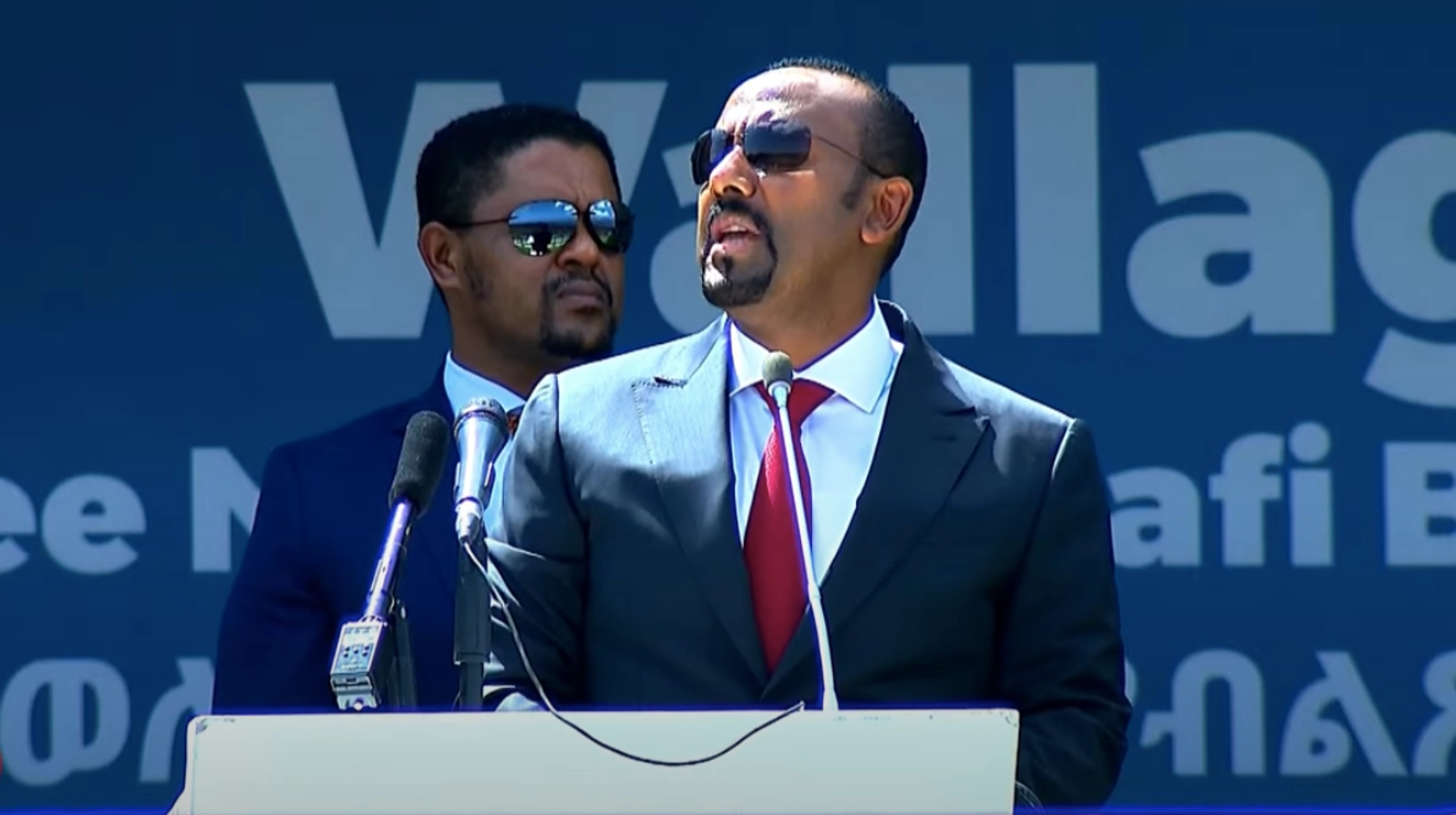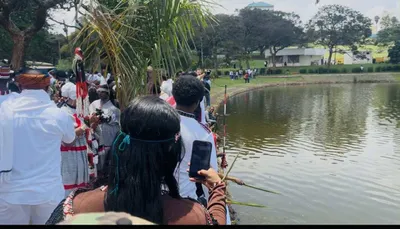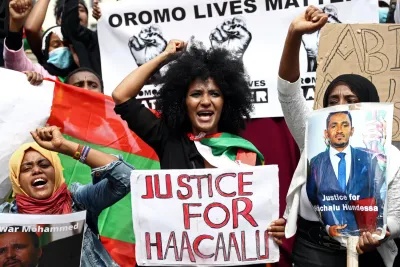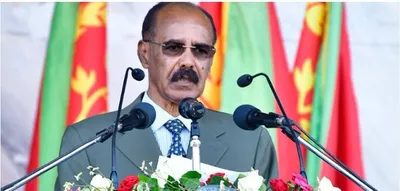The roots of Abiy’s anti-Wallaga bias

Prime Minister Abiy Ahmed addresses the public at Wallaga Stadium in Nekemte, Oromia, on May 8, 2024.
Gedu Andargachew, former National Security Advisor to the Prime Minister of Ethiopia, recounted in a recent interview two incidents where Prime Minister Abiy Ahmed, his former boss, made a disturbing remark about Wallaga and its people. The first instance occurred when Gedu nominated a career diplomat who happened to hail from Wallaga for a key position in Ethiopia’s Ministry of Foreign Affairs. Upon learning Gedu’s choice for the position, Abiy reportedly pointed out that the nominee is from “Wallaga,” and scorned him for trusting people from that area.
The second instance occurred when Gedu approached the Prime Minister to discuss the conflict between the Oromo Liberation Army (OLA) and the Ethiopian National Defense Force (ENDF), which by then was ravaging parts of the Wallaga Zones. Gedu’s concerns were once again dismissed by Abiy, who responded, “Wallaga aschegariwoch nachew.” (Wallaga [Oromos] are a difficult people.)
In this piece, I seek to substantiate Gedu’s testimony by drawing on my own encounter with Abiy Ahmed in 2014. Beyond this personal account, I argue that the Prime Minister’s negative perception of Wallaga is emblematic of the antagonism that exists between the Oromo people and the Ethiopian state.
My First Acquaintance with Abiy Ahmed Ali
In late 2014, I was part of a group of academic and administrative staff from Wallaga University that embarked on a tour to gain valuable experience from various notable federal government institutions and enterprises. The institutions we visited during our tour included the massive military-industrial conglomerate Metal and Engineering Corporation (METEC), the Defense Engineering College, the Dejen Aviation Industry, the Information Network Security Agency (INSA), the Hibret Manufacturing and Machine Building Industry, and the Knowledge Management Directorate, a relatively unknown office within the FDRE Ministry of Science and Technology.
Almost all institutions we visited were associated with the ENDF, except for the Knowledge Management Directorate which was under the Ministry of Science and Technology. Considering the tour was organized by Abadula Gamada, a military man and chairman of the university’s board at the time, a visit to institutions associated with the ENDF was not surprising.
Moreover, at every institution we visited, we were notably told about the country’s readiness to defend itself against all forms of attacks and internal protests. The presentations we attended featured military vehicles and various kinds of armaments purportedly manufactured by METEC, as well as military aircraft and surveillance drones. Some of us were puzzled as to why Abadula wanted us to listen to the bravado and level of preparedness of the army.
In our private discussions, we started questioning the relevance of this tour to our roles as representatives of an academic institution. The fact that the visit took place a few months after the Oromo Protests broke out in April 2014 added to our confusion regarding the motives and objectives of the institutional tour.
Among the officers we met during the tour, two caught my attention. One of them was Brigadier General Tena Kurunde, who stood out to me because he was the first military officer we encountered who spoke Afaan Oromoo. The second officer was the person we met at the Knowledge Management Directorate within the Ministry of Science and Technology. This was none other than Abiy Ahmed, a former military officer.

Our reception at Abiy’s office was particularly special. Upon arrival, we were greeted by a group of female employees who were dressed smartly and appropriately. Shortly after we made our way to the meeting hall, Abiy received us with a warm welcome. He greeted us in Amharic and continued his speech in the same language. However, his immediate comment —“Frequency liqeyir inde?” (Should I change the frequency?) — caught us all off guard. He was trying to imply that he speaks Afaan Oromoo and could conduct the meeting in our language, if needed. Repeating the same remark he would make to Gedu Adargachew after becoming Ethiopia’s prime minister, he then said, “Inante kewede mi’rab yemitmetu sewoch aschegariwoch nachu.” (You people who come from the West are difficult people.)
Meaning and implications
Abiy Ahmed’s negative perception of Wallaga is deeply rooted in the historical relationship between the Oromo and the Ethiopian state, as well as his own role in the state’s military campaigns against the Oromo Liberation Front (OLF) in the early 1990s. Wallaga has been one of the strongholds of the OLF, which began its operations in the region in the late 1970s and early 1980s. Through sustained political mobilization and clandestine organizing, the OLF was successful in fostering a strong sense of Oromo national identity among the local population, producing many of the movement’s most prominent leaders. As a result, Wallaga has come to be widely regarded—by both Oromos and non-Oromos—as one of the epicenters of the Oromo struggle for self-determination, at least in recent years. In the early 1990s, Abiy himself was stationed in Wallaga as a soldier fighting against the OLF on behalf of the state. His firsthand experience of the region’s fierce resistance to state repression likely shaped his enduring perception of the area and its people.
His remarks about Wallaga perpetuates negative stereotypes and prejudices against target subjects. In my opinion, anyone who makes such a statement implies that individuals from that particular region are unwilling to assimilate and integrate into the state. Such accusations are often used to suppress the community and individuals from labeled areas without cause.
Someone who is assimilated to Ethiopian nationalism, not only carries such negative perceptions and stereotypes but also believes that the accounts of suffering experienced by the Oromos at the hands of Ethiopian empire builders are not genuine and true history. Abiy Ahmed has referred to the history of the Arsi Oromo such as the Anole massacre and others as ‘terek’ (a false narrative.) To him, only the narratives of the empire builders he wants to emulate are real. Consequently, it can be argued that he believes that the historical facts upon which the present federal system in Ethiopia was founded are incorrect. His problem is not only with historical facts but he also fears that the integrity of the Ethiopian state is jeopardized due to Oromo nationalism and the current federal arrangement. Thus, he wishes to undo both.
One important point to note in relation to Abiy’s attitude towards Oromo nationalism in general is that this negative perception has shaped his policy. This has made him view Oromo nationalists through securitizing lenses, which has led to the brutal suppression of dissent by force and the prioritization of military solutions for the problem. This, in turn, has heightened insecurity not only in Wallaga but also in all those areas in Oromia where youth have taken up arms to challenge the state.
From Abiy’s remark to Gedu, one can also see that dissent is conflated with disloyalty. Abiy, personally perceives Oromo nationalists in general, and people from Wallaga in particular, as disloyal to the Ethiopian state. They are not reliable, not to be entrusted with the task of representing Ethiopian national interests . As such, they must be excluded from key positions within Ethiopian state machinery.
His remark during our visit about language appears to have been a criticism for not speaking the language of the state in our daily communication. Such political stances and viewpoints not only undermine the principle of inclusivity and recognition of diversity, but rather lead to the marginalization of a certain group from all aspects of public life and deepen the feeling of disenfranchisement further exacerbating tension and conflict.
Furthermore, anyone who keenly observes Abiy’s speeches can easily recognize that the tone and message in his private remarks about a certain group or locality are contrary to his public statements, as testified by Gedu and myself. While he publicly advocates for unity, his private comments often reveal discriminatory attitudes, a clear indication of hypocrisy.
It is important to note that othering a section of a society and pitting groups against one another, be it within the Oromo society or one ethnic group against the other has been the preferred form of ‘governance’ for Abiy Ahmed. This method, which fosters an atmosphere of mistrust and division among political elites, has helped him prevent the morphing of a unified opposition to his rule. By alternating the ‘othered’ group, Abiy can manipulate narratives to align with his political needs at any given time, potentially allowing him to justify certain policies or actions.
This is a classical Machiavellian approach of ‘divide and rule’ and it has helped him achieve a personal political goal of maintaining and consolidating power. This political maneuvering has serious negative repercussions for the country’s social fabric, political dynamics, and stability. Primarily, it can intensify existing regional and ethnic tensions by constantly shifting the ‘othered’ group and creating a perpetual cycle of conflict and resentment among different sections of society.
We need your support
We trust you found something of value in this article. If so, we kindly ask you to consider helping Curate Oromia continue its work.
If you believe in the importance of independent voices and honest reporting, we invite you to support our efforts through our GoFundMe campaign.
Every contribution, however small, goes directly to our writers and the expansion of our reach.
Thank you for your support.



